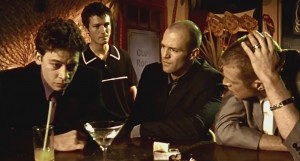
What is Cockney rhyming slang?
If you’ve ever been to London and witnessed people speaking a strange kind of English that you didn’t understand, you were probably hearing Cockney rhyming slang. CRS replaces one word with a pair of words that rhyme with it. For example, ‘trouble and strife’ means ‘wife’ in Cockney rhyming slang, so you might hear someone saying:
Where’s my trouble and strife?
What he means is, ‘Where’s my wife?’ And to make matters worse, sometimes only one word from the pair is used, so somebody might just say:
Where’s my trouble?
Quite a long way from the original sentence, isn’t it?
Where does Cockney rhyming slang come from?
Cockney rhyming slang, which is spoken by Cockneys, originated in the mid-nineteenth century in the East End of London. A Cockney is someone who was born within earshot of Bow Bells (the bells of a particular church in East London), but now it really just means any Londoner with a specific kind of accent.
No one knows how or why Cockney rhyming slang developed. Some say it was spoken by criminals to confuse the police, while others think it was used by market traders to talk to each other without their customers knowing what they were saying. Whatever the case, it probably also served a double purpose of maintaining a sense of community.
One of the interesting things about Cockney rhyming slang is how it changes over the years to reflect popular culture. In the 1980s, ‘flares’ (a type of trouser that gets wider at the bottom) were referred to as ‘Lionel Blairs’ after the famous actor. Nowadays, they’re known as ‘Tony Blairs’ after the ex-Prime Minister:
Anyone seen my Tony Blairs?
Another example is that ‘Scooby Doo’ suddenly started to mean ‘clue’ with the arrival of the mystery-solving cartoon dog on TV:
I haven’t got a Scooby!
Films and music
If you’re a fan of British films and music, chances are you’ve come across Cockney rhyming slang at some point before. In the film Lock Stock and Two Smoking Barrels, Barfly Jack makes heavy use of it when telling a story about someone being set on fire. Amusingly, the scene has been subtitled in ‘normal’ English, with additional flashbacks to help the viewer understand. And to be honest these extra measures are completely necessary to know what’s going on – even for a native speaker!
In the 1960s, the influential British rock band The Kinks recorded a song called ‘Harry Rag’, which refers to the Cockney rhyming slang term for cigarette, ‘Harry Wragg’, or fag:
I’ll do anything just to get a Harry Wragg
Further examples
I’ll finish with some other popular examples of Cockney rhyming slang for you. Can you guess what these mean? (Answers are at the bottom of the page.)
Ouch! He hit me in the north and south!
That man’s got huge plates of meat
I don’t like it when you tell porkies (porky pies)
Let’s have a butcher’s (butcher’s hook)
I’ll call him on the dog and bone
I’m just going up the apples and pears
It’s all gone Pete Tong
Hi me old china! (china plate)
Matt Lindley is an English teacher and blogger living in East London. He blogs for HotelClub, a website where you can find great deals on London hotels and more.
Answers: mouth, feet, lies, look, phone, stairs, wrong, mate